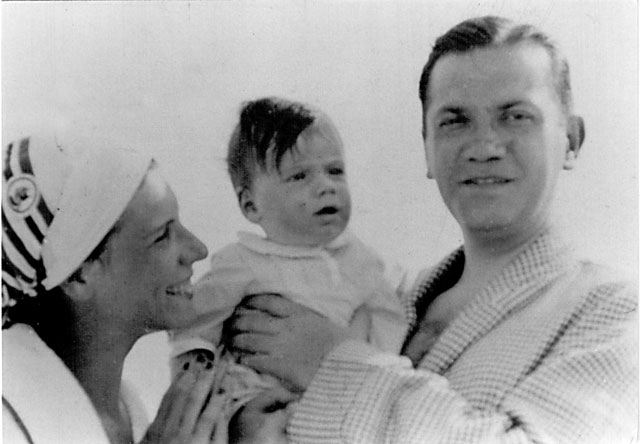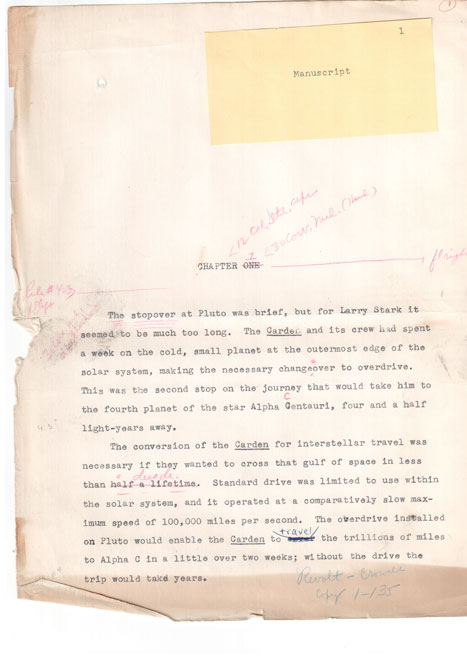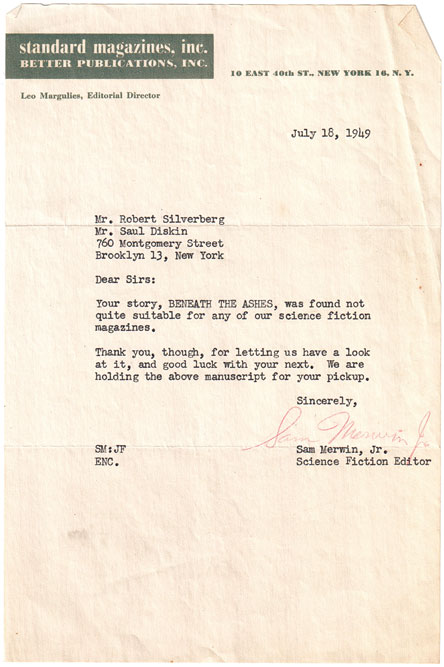To Live Again and The Second Trip (55 page)
Read To Live Again and The Second Trip Online
Authors: Robert Silverberg
Tags: #Library Books, #Fiction, #Science Fiction

But what’s this? In the moment of triumph she tires. She weakens. The bolts lose intensity, and Hamlin still lives! He regains strength. She cries out for help.
Paul, Paul, Paul, Paul.
Yes, he replies, from his place beyond the zone of combat. Hamlin has risen. He is hideously disfigured, he is maimed and ruined, but yet there is demonic power in him, and now he lashes back at her, trying to bring her tumbling down to his own level. Crackling energies climb the sky. Help me, Paul!
And Macy opens himself to her, letting her take from him whatever she must have, and he arms her so that she can return to the attack. Again her lightnings flash. Again Hamlin howls. His thrusts are beaten back. He cannot fight on. He falls. A bolt pierces his back. He twists and coils in frightful convulsions. Lissa transfixes him again. Again. He is burning. He is dying. The odor of charred flesh on the wind. The sky is a sheet of white fire. She is spending herself, emptying herself, to eradicate him. She is cutting him to pieces.
Hamlin still moves, but now only in the random galvanic twitches of the dead. The meadow is a blazing pyre. He burns. He burns. He dwindles. He is gone. The sky grows still. Lissa can no longer be seen. A strange silence has come; a gentle cooling rain begins to fall. The air is sweet. The clouds part; the rain ends; the soft sunlight returns. There is no gulf between the regions of the brain. Macy’ crosses over. He sees no trace of Hamlin but only a dark place on the ground, a blackened scar in the grass, and quickly the grass grows to hide it, tall green blades moving swiftly in, sprouting tender new shoots that rise and meet, and soon there is no sign of destruction anywhere, although Macy knows that beneath the graceful grassy carpet one might find a layer of ash, if one chose to excavate. He walks away from that place. He is utterly alone. Lissa? he calls. Lissa? But there is no reply. Silence governs. He is utterly alone.
After a time he sat up and got carefully to his feet. The sense of being alone remained with him. There was a faint throbbing in his head, of the sort one might feel if one were transported suddenly from the heart of some great city to the eerie soundless wastelands of the polar plateau, but otherwise he was aware of no aftereffects of the battle. Except one. Hamlin was gone from him. That much was certain: Hamlin was gone.
He looked at Lissa. She lay as before, limp, glassy-eyed, self-isolated. Her bare skin glistened with sweat. The feverish look had left her, and, touching her side, he found that she was indeed cooler. Not only the fever had departed from her, though. For the first time since he had known her, Macy was unable to detect that look of terrible strain in her features, that expression of barely suppressed despair. She was calm. Her inner storms, as well as his, were over. But her calmness was of a frightening sort. She seemed vacant, almost entirely absent.
“Lissa?” he said. “Can you hear me?”
“Lis—Lis”
“Lissa.”
“Lis—”
“Lissa,” he said. “Lissa is you.”
“Lissa is you.” Her voice was high, childish, fluting, toneless.
“No. No. I’m Paul. You’re Lissa.”
“I’m Paul. You’re Lissa.”
He sat beside her. He took her hands in his. Her fingers were very cold. Her eyes closed a moment; then the lids fluttered and she opened them and looked at him in a sunny, uncomprehending way, and she smiled. He said, “You’ve burned yourself out, haven’t you? You just used up everything you had. To save me. And now there’s nothing left but a husk.”
“Husk.”
“Is the ESP gone too, I wonder? Can you still hear the voices? Do you hear them, Lissa?”
“Voices. Do you. Hear them. Lissa.”
“You don’t, do you? Not any more.”
“No,” she said unexpectedly. “I don’t hear. Anything.”
Her response startled him. “You can understand me now? The voices are really gone?”
A smile. A fluttering of the eyelids. A babyish giggle. “The. Voices. Are. Really. Gone.” She had slipped away from him once more.
He searched the room for a telephone. None. He went to the door and looked into the hall. A phone out there, yes. Someone using it. Chattering away. All right, I’ll wait. A few minutes. And then phone Gomez. Send your van, I’ll tell him. Manhattan North People’s Co-op, and hurry. Not for me. For her, for Lissa. Yes. Burned out, hardly knows her own name. But there’s something still intact down deep inside her. Not much, but enough, maybe, for you to work with, Gomez. No, you don’t have to bother with me. I’m okay. It’s over. Hamlin’s gone, obliterated for keeps, gone, really gone. A total deconstruct. But the girl. Can you fix her, Gomez? Can you put her back together? It won’t be like a reconstruct, exactly. You won’t have to pour a new identity into an old body, just put an old identity back where it belongs. Okay, Gomez? You’ll do it? Good. Good. And how long will it take? Five months, six, a year? Whatever. Just do it.
Five months. Six. November. December. Macy saw himself waiting at the main building of the Rehab Center. Snow on the ground, the branches of the trees heavy with whiteness, the sky a wintry blue. And Lissa, renewed, repaired, coming toward him out of the inner wing. No longer a telepath. A brand-new Lissa, stripped of her gift and of her torment. Uncertain of herself as she goes forth to face the world. Hello, he’ll say. Hello, she’ll say. An awkward little kiss. Button up, he’ll tell her, it’s cold. I’ve got a car. She’ll look worried. Are we going into the city? she’ll ask. My first day out. I’m nervous. You know what it’s like, Paul, coming out. Sure, he’ll say, I know just what it’s like. But you’ll be all right. New people, new lives. The second trip. Paul and Lissa, Lissa and Paul Minus our old friend Nat. A great artist has gone from the world. How quiet it is inside my head. Five months. Six. November. December. Lissa?
She was giggling softly, and her hands were exploring her body, discovering this and that as a baby might. Lightly he touched her cheek. She wriggled in pleasure. You wait, he said. Gomez will fix you better than you were before. Macy peered into the hall again. The phone still busy. Come on, get off the line, get off, get off! He didn’t say it He stood in the doorway, waiting to make his call, half expecting Hamlin to rise from somewhere, but Hamlin did not arise. Gone. Gone. My other self, my dark twin. He has left the world, and I have his place. Macy almost felt guilty about it. The merest flicker of regret. Farewell to you, Nat, a long farewell to Mr. Hyde. And I will go on through life without you. Wearing your skin, wearing your face. I am you, Nat and you are nothing.
Macy looked back at Lissa. She was drooling. As I must have drooled, he thought. Four years ago when I was very new. He went to her and mopped her chin. It’s all right, he said to her without bothering to speak aloud. December isn’t so far away. And then hello, and then we start again. Two ordinary people. Trip two, yours, mine. The second trip. The good one, maybe. From the hall came the click of the receiver. The phone was free at last. He went out to call Gomez.
Robert Silverberg (b. 1935) is an American author best known for his science fiction titles, including
Nightwings
(1969),
Dying Inside
(1972), and
Lord Valentine’s Castle
(1980). He has won five Nebula Awards and five Hugo Awards. In 2004, the Science Fiction and Fantasy Writers of America honored Silverberg with the Damon Knight Memorial Grand Master Award.
Silverberg was born in Brooklyn, New York, on January 15, 1935, the only child of Michael and Helen Silverberg. An avid reader and writer from an early age, Silverberg began his own fanzine,
Spaceship
, in 1949. In 1953, at age eighteen, he sold his first nonfiction piece to
Science Fiction Adventures
magazine. His first novel,
Revolt on Alpha C
, was published shortly after, in 1955. That same year, while living in New York City and studying at Columbia University, Silverberg met his neighbors and fellow writers Randall Garrett and Harlan Ellison, both of whom went on to collaborate with him on numerous projects. Silverberg and Randall published pieces under the name Robert Randall. In 1956, Silverberg graduated from Columbia University with a bachelor of arts degree in comparative literature, married Barbara Brown, and won the Hugo Award for Most Promising New Author.
Following the whirlwind of his college years, Silverberg continued to write consistently for most of his life. Writing under various pseudonyms, including David Osborne and Calvin M. Knox, Silverberg managed to publish eleven novels and more than two hundred short pieces between 1957 and 1959. Having established himself as a science fiction writer by this time, Silverberg went on to show dexterity in other genres, from historical nonfiction with
Treasures Beneath the Sea
(1960) to softcore pornography under the pseudonym Don Elliot.
Silverberg continued to write outside science fiction until Frederik Pohl, the editor of
Galaxy Science Fiction
, convinced him to rejoin the field. It was in this period, from the late 1960s to early 1970s, that Silverberg’s classics, including
Tower of Glass
(1970),
The World Inside
(1971), and
The Book of Skulls
(1972), came to life. After taking a break from writing, Silverberg returned with
Lord Valentine’s Castle
in 1980.
Though they had been separated for nearly a decade, Silverberg and Barbara officially ended their marriage in 1986. A year later, Silverberg married fellow writer Karen Haber. They went on to collaborate on writing
The Mutant Season
(1990) and editing several anthologies. Throughout the late 1980s and 1990s, Silverberg published important titles including
Star of Gypsies
(1986), and continued his established Majipoor series with
The Mountains of Majipoor
(1995) and
Sorcerers of Majipoor
(1997). In 1999, Silverberg was inducted into the Science Fiction Hall of Fame.
With a career that spans half a century, multiple genres, and more than three hundred titles, Silverberg has made major contributions as a writer. He currently resides in the San Francisco Bay Area with his wife.

Silverberg at six months old with his parents.

Silverberg at summer camp in August 1952, reading the September issue of
Galaxy Science Fiction
, which featured a story by Theodore Sturgeon.

The first page of Silverberg’s manuscript for his first novel,
Revolt on Alpha C
, published in 1955.

